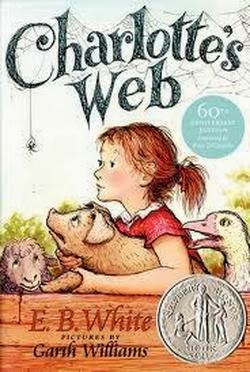Wilbur burst into tears. "I don't want to die," he moaned. "I want to stay alive, right here in my comfortable manure pile with all my friends. I want to breathe the beautiful air and lie in the morning sun."That, of course, is the voice of Wilbur the pig from "Charlotte's Web." Charlotte, the spider, with her ability to write words in her web, does indeed save Wilbur from ending up on the dinner table. Having recently become vegan, I eagerly reread the book but was surprised to learn that the book's author, E.B. White, far from being a vegetarian or animal rights activist himself, was actually a gentleman farmer who raised pigs for food.
How did someone who raised animals for food come to write one of the most compassionate farm animal tales of all time? E.B. White said that the original idea for the book popped into his head as he passed by his pig pen one day: "I began feeling sorry for the pig because, like most pigs, he was doomed to die." Later that season, an unexpected event deepened his empathy for the animal and laid the groundwork for the story of Charlotte. 1E.B. White's pig fell deathly ill and the author threw himself into trying to nurse the animal back to health. White so felt horrible when his efforts failed that he wrote an essay about the experience for the Atlantic Monthly magazine. 2 E. B. White must've still been haunted by the experience, though, because a few years later he created "Charlotte's Web," which as one of his close friends commented, must have served as a way for him to finally be able save the life of his pig.
"But it's unfair," cried Fern. "The pig couldn't help being born small, could it? If I had been very small at birth, would you have killed me?" Mr. Arable smiled. "Certainly not," he said, looking down at his daughter with love. "But this is different. A little girl is one thing, a little runty pig is another." "I see no difference," replied Fern, still handing on to the ax. "This is the most terrible case of injustice I ever heard of."A queer look came over John Arable's face. He seemed almost ready to cry himself.Have you seen the popular online video, of Luiz Antonio, the toddler who tells his mother that he doesn't want to eat animals any more? (Check it out if you haven't, it's amazing! 3 ) At the end of the video Luiz' mother begins to cry, not unlike response of the "queer look" that comes over the face of Fern's father in "Charlotte's Web." I wonder if both parents are remembering a time when they themselves were children and were allowed to feel compassion for these "food animals".
E.B. White, John Arable, Luiz' mother and most of us live in a culture that has convinced us that it is part of the "cycle of life" for humans to consume animal flesh. In my recent research after having given up eating animal products, I have learned there is no nutritional reason why humans need to consume animal based food (other than for vitamin B12, which we used to get from eating more dirt, but which can be gotten by taking a supplement.) In fact studies now show that a vegetarian or vegan diet can lead to a longer, healthier life than one based on animal products 4 so there is hope that many animal lives might be saved if only more people would be willing to learn to eat differently.
I hold out hope because, after all, "Charlotte's Web" went on to become the best selling children's paperback book of all time. It has certainly touched the hearts of more than few generations of book and animal lovers. Even though E.B. White might not have been able to save the life of that one pig on his farm, his story might help to save the lives of many, many more.
"It is not often that someone comes along who is a true friend and a good writer. Charlotte was both."
All quotations from "Charlotte's Web", copyright renewed © 1980 by E.B. White.

Comments
Post a Comment